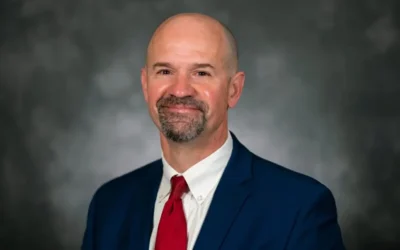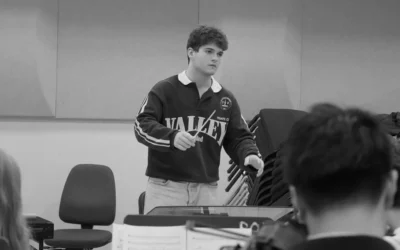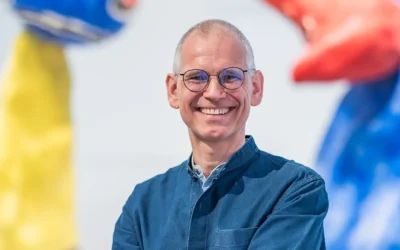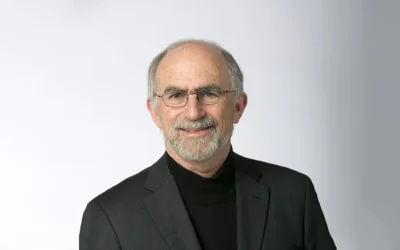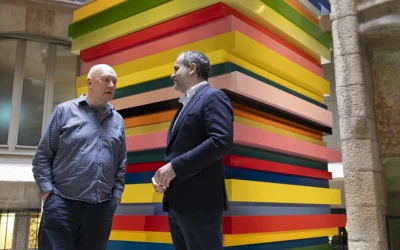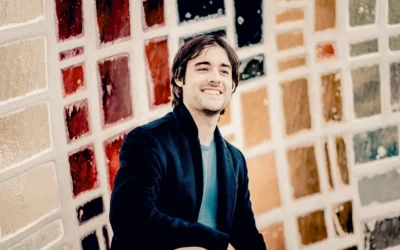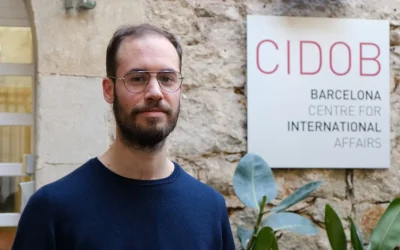Francesc Garriga: “What is the limit, when ‘sky is the limit’?”

Francesc Garriga is one of the most recognized figures of Catalunya Ràdio and Catalonia’s public television. A member of the CCMA since 2005, he has worked at Catalunya Ràdio, Esport3 and TV3, and has led programs such as El club de la mitjanit and Onze. Since 2021, he has been the Washington correspondent for Catalunya Ràdio, from where he observes and explains firsthand the country that turned the “American dream” into a global symbol.
In this interview, he reflects on what truly remains of that ideal, the cost of pursuing it, and the limits of a model deeply shaped by individualism.
What does the American dream mean today? Is it still a real ideal?
For many people, the American dream is still the idea that with effort, persistence, and the ability to get back up, you can go much further than where you come from. There are still real stories of people who arrive with nothing and end up living in stability with children in college. That narrative remains alive, and many people truly believe in it. However, what has changed is the price of achieving it: today everything is more complicated, more expensive, and more demanding, but the opportunities are still there.
Would you say the concept of success in the U.S. has changed?
It’s flexible: for some, success means putting food on the table; for others, building a multimillion-dollar start-up. What has changed is the cost of any of those achievements: today you need more hours, more jobs, and more sacrifices to end up in the same place. Opportunities exist, but they are harder to seize. And that makes the dream feel more distant, especially for the most vulnerable groups.
What do you mean by cost?

Many Uber drivers work twelve- or fourteen-hour days, six days a week. They do it with pride because they’ve managed to get their children into college, but at the same time they admit they have no life beyond work. This duality is very American: pride in effort, but also an awareness of sacrifice, which transforms into tangible results. It’s the other side of the dollar bill, which everyone admires.
It seems that 30 years ago it was easier for an immigrant. How have arrival conditions changed?
The social and political climate is much more hostile. Years ago, people discussed regulating immigration, but newcomers weren’t openly criminalized, whereas now the public discourse is much harsher. Many migrants say they live in fear that one day a raid will expel them from the country, despite having spent decades working and paying taxes. This turns the pursuit of the dream into a race full of uncertainties, though still with opportunities.
Does this insecurity also affect many locals?
Yes, the lack of strong public structures means that any unexpected event can trigger a deep crisis. There are families who, after a health problem or job loss, have spiraled into homelessness. Material fragility is very high, but it’s also a country that heavily rewards individual initiative, where reinventing yourself professionally several times in life is quite common.
How is it possible that in such an expensive country so many people still get rich?

Everything is expensive, but salaries are also higher and the culture of opportunity is omnipresent. Many people see student debt (even when it reaches $150,000 or $200,000) as an inevitable investment, not a burden. The philosophy is: “If I can, or will be able to, pay it someday, then go for it.” This logic completely clashes with Europe’s more savings-oriented mentality. Many families end the month with 0 dollars in their account.
Does the education system aim to create entrepreneurs or human beings?
They strongly emphasize competitiveness and the ability to present oneself in public. From a young age they work on public speaking, confidence, and how to “sell yourself,” which produces adults far more accustomed to showing and defending themselves. From childhood they are told that “the sky is the limit.” In Europe, by contrast, we value the entire class progressing together. There, the message is: “You go ahead, we’ll help those left behind later.” The result is a society with great talent and opportunities, but also with major inequalities.
Where are the limits in a society that says “sky is the limit”?
There are sectors that would like to eliminate almost all regulation, and this leads to constant debates about what should or shouldn’t be regulated. In the end, they look for a minimum common denominator that allows a certain order to be maintained without clipping anyone’s wings. The result is a creative society capable of constantly generating ideas. This also produces differences between those who move forward faster and those who don’t, making the social safety net weaker.
What consequences does this have in the daily lives of Americans?

The number of homeless people in the U.S. is astonishing compared to Europe. An illness, a layoff or a family crisis can trigger a fall from which it is almost impossible to recover without public support. Without a safety net, a slip becomes a tragedy. And what’s most surprising is that many people accept it as an inherent part of the system.
How does such strong individualism coexist with such omnipresent patriotism?
It’s a typical American paradox: each state has its own identity and its own laws, but everyone recognizes themselves under a common flag. That flag unifies, but behind it lies an exaltation of individual freedom above all else. It is a society built on many individualities coexisting under the same national umbrella: 50 independent stars under a single flag.
And how do you experience this as a European and a journalist?
You must make a constant effort to look with different eyes and understand that their logic is not ours. On the issue of guns, for example, the European reaction is “ban them,” but politically that option simply doesn’t exist there. The job of a correspondent is above all to translate that difference without judging. And when you manage to do that, you discover a complex but fascinating society.
What role does religion play in this worldview?

Religion is omnipresent, but sometimes very selective. Biblical values are invoked to oppose abortion, but ignored when the Church criticizes anti-immigration policies. Privately, everyone declares themselves very religious, but when a bishop questions certain narratives, he is called “woke.” It is a religiosity conditioned by each group’s political project.
Is the American dream more mirror than reality?
Like all great ideals, it has a part that’s narrative and a part that’s real. Success stories are real and spectacular, but the system also leaves people on the margins. Deep down, Americans acknowledge this naturally: they accept the collateral damage because they believe that to create an explosion of light, there must also be shadows. It’s a balance that is difficult to understand from here.
Do you think the American dream will endure in the coming decades?
The country is living through a key moment, and today’s decisions will strongly shape its future. The current reforms may open a new stage of innovation, but they could also weaken science and development. The U.S. will remain powerful, but I’m not sure it will maintain the same moral and cultural leadership. What I do see is that the American dream, as we understood it, is undergoing a major revision.
